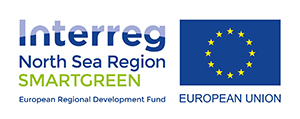Staying Smart and Growing Green
Thousands of growers across the North Sea Region (NSR) make significant efforts to remain as energy efficient as possible while producing high quality fresh fruit, vegetables, and ornamental plants. However, more can always be done to reduce the levels of energy used for lighting, heating, and climate control within greenhouses.
A pioneering new research collaboration – featuring nine research institutions and three commercial companies spanning six different countries – is shining a spotlight on the energy efficiency objectives of growers across the NSR using the newest technologies.
The SMARTGREEN project aims to reduce energy consumption, generate significant environmental benefits, and introduce innovative new technologies, without compromising quality and production time, but perhaps even creating crops with better quality and taste.
Greenhouse production of fresh fruit, vegetables, and ornamentals is a successful, innovative component of the North Sea Region economy with an output of £7.75 billion annually, and directly employing more than half a million people. It embraces more than 10,000 very diverse SMEs with a high value supply chain and provides sustainable and healthy food to millions of consumers. However, all the producers in the NSR are facing challenges, such as high reliance on energy, water and a low use of renewable energy in some areas of the region. The Greenhouse production systems are also extremely varied across the NSR – the energy supply and management systems differ and so does the organisation, the type and the sizes of the SMEs.
The project is led by Professor Carl-Otto Ottosen from the Department of Food Science at Aarhus University in Denmark, with the University of Lincoln, and Professor Simon Pearson, Director of the Lincoln Institute for Agri-food Technology, spearheading research efforts in the UK.
Professor Simon PearsonBy increasing the understanding of greenhouse resource use, SMARTGREEN aims to help growers make long-term changes that will improve productivity and profit, while also delivering major environmental savings – less pollution, lower resource use and reduced CO2 emissions.
It is widely agreed that new CO2 emissions targets might be difficult to reach for the greenhouse industry, which is why SMARTGREEN suggests introducing a range of new technologies developed in different parts of the NSR.
The SMARTGREEN project combines analysis of Big Data regarding climate and production with practical demonstrations at SMEs to illustrate how growers can reduce energy consumption. Development and application of sensors and measuring systems as well as energy efficient control of greenhouses will contribute to fulfilling the goal of improving energy efficiency by approximately 10%.

Meet the Expert
Professor Simon Pearson
Director of the Lincoln Institute for Agri-food Technology and

Simon Pearson is Professor of Robotics and Autonomous Systems and leads the University's Centre for Doctoral Training in agri-food robotics.
